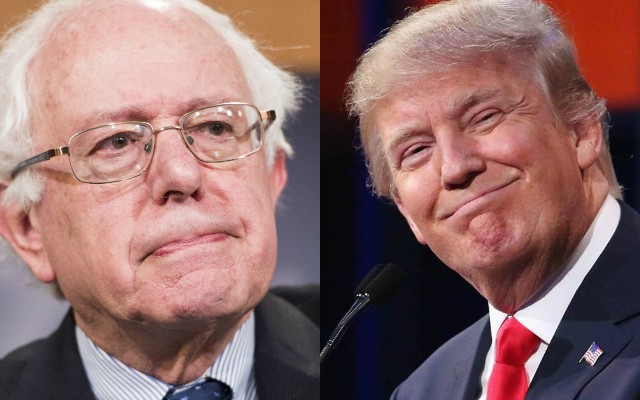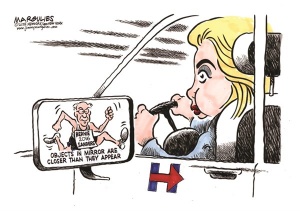By Kenzi Abou-Sabe
The Season for Authenticity
“The fact that [Trump’s] not a career politician is appealing to a lot of people. He’s very no bullshit. I think the American people appreciate that a lot. But I also think Bernie Sanders is the same way. He has his opinions, he’s not pandering, and has great consistency.”
That was twenty-something New Yorker, Justin, discussing the commonalities he thinks presidential candidates Donald Trump and Bernie Sanders share. Justin’s not the only person pointing out similarities between the two populists.
Two seemingly disparate candidates have, and maybe for the first time, successfully stolen the narrative of this election cycle from the establishment.
Forward-looking calls of “hope” and “change” in Obama’s 2008 run have been replaced by an angrier, more frustrated admonition of “establishment” and “the machine.”
The candidates still take selfies and engage in orchestrated games of pickup basketball, but the 2016 election cycle has noticeably shifted into a critical authenticity contest, and the candidates’ game plan is simple.
Neither takes corporate campaign donations. Neither panders to centrism, but actually actively panders to the fringe. And most tellingly, neither was thought to have a shot one year ago.
Bernie Sanders and Donald Trump aren’t running for the presidency as much as running against corporate greed (Sanders) and government mismanagement (Trump).
Neither candidate has made himself particularly available to discuss the nuances of issues outside of his particular rallying point. Instead, the two men have adopted twin strategies in an election that so far has been predicated on the ability to rally people against the status quo.
The Establishment
Some voters perceive Sanders’ authenticity as especially stark when compared to competitor and former Secretary of State, Hillary Clinton.
“The problem is she may be really well qualified, but there’s a lot of history that people may not be that comfortable with,” explained Sally K., a woman in her seventies. “The refreshing thing about Bernie Sanders is he just doesn’t have that much history.”
President Obama recently spoke to Politico about Sanders’ “refreshing” qualities as well.
“Bernie came in with the luxury of being a complete long shot and just letting loose,” he said. “I think Hillary came in with the both privilege—and burden—of being perceived as the front-runner… You’re always looking at the bright, shiny object that people haven’t seen before—that’s a disadvantage to her,” Obama said.
“Most of the people under 29 support Bernie Sanders, and most of the people older than 29 support Hillary Clinton, because to older people, Hillary Clinton is new, and not a man. But to younger people, everything she’s saying is old, or her track record isn’t liberal enough,” said Chris Weiss, a New Yorker in his thirties.
Riding a similar anti-establishment wave, Trump has been arguably more vocal in calling out his own party than he’s been in attacking the Democratic contenders.
In the Greenville, South Carolina GOP debate February 13, Jeb Bush stood on stage and exemplified the Republican establishment’s belief in focusing all critique on the Democrat in office—President Obama—while Trump taunted Jeb as “weak,” and repeatedly called the foreign policy of his brother, former President George W. Bush, a “disaster.”
Three weeks later, Trump continues to rack up delegates, and the younger Bush is no longer in the running.
Inspiring People to Care…Again
Trump has somehow successfully tapped into Republican voters’ desires for a passionate and authentic critique of the current state of their party.
“Lately it seems like candidates look good on paper, but don’t make you feel patriotic, and I guess both of them do make you feel patriotic, in one way or another,” Weiss intoned.
Getting voters fired up against the way things are isn’t a remotely novel campaign strategy—Obama’s “hope and change” campaign tapped into that sentiment, and wasn’t the first to do so.
In fact, David Axelrod, Obama’s campaign manager for both his Senate race and eventual underdog presidential win—not to mention the man who reportedly coined both “hope and change” and “Yes we can!”—has chalked up the success of their campaigns to just that.
“When incumbents step down, voters rarely opt for a replica of what they have, even when that outgoing leader is popular. They almost always choose change over the status quo. They want successors whose strengths address the perceived weaknesses in the departing leader,” Axelrod wrote in his memoir, “Believer: My Forty Years in Politics.”
Tad Devine, who currently advises the Sanders campaign, has a similar approach, but rather than focusing on a promising future, he critiques the present in a way that necessitates Sanders’ future of choice.
Because Sanders has vowed not to engage in attack ads, Devine—whose firm’s attack ads are considered the best in politics—is left in the curious predicament of having to generate negativity around Clinton without explicitly doing so.
Devine calls this strategy “embedding,” because it plants negative messages about Clinton’s record in social media and campaign ads. The efficacy of that campaign has been pretty apparent to anyone who’s had the pleasure of hearing frustrations about Clinton from a “Bernie bro.”
Somehow, the Sanders campaign has inspired liberal Democrats to the tune of Obama’s grassroots popularity, but by harnessing an anger that more closely mirrors the sentiment of Trump’s voters.
On the Issues
The benefits in perception and popularity that both Trump and Sanders have reaped by behaving authentically are fairly apparent. The crossover in their policies is certainly less so.
Lax on gun control, tight on immigration and free trade, and morally opposed to the Iraq War, the native New Yorkers actually agree on a number of policies.
After all, the men are most popular among the far wings of their parties. For Trump, that means he’s garnered fans from the religious right and Tea Party, while Sanders has successfully courted both the fiscal far left and liberal Millennial youth.
“People are angry about the same thing. They don’t like politics as usual,” Weiss explained, “Nothing’s been happening in Washington for so long,” he continued, “So somebody who’s not a part of the system needs to, you know, shake things up.”
If you rule out the possibility of coincidence and really attempt to understand the overlap that exists between the disparate men, their common views actually point to an untapped centrism that exists in this country.
A centrism of belief that doesn’t involve perpetuation of the status quo, but actually represents the common interests of Americans on opposite ends of the political spectrum.
It sounds a bit like a utopian pipe dream, but Pulitzer Prize-nominated Ronald Brownstein of The Atlantic made a case for that very potential in his latest editorial.
“Sanders and Trump are rising largely because they are amplifying the voices of constituencies that have usually been outshouted in fights for their party’s nomination,” Brownstein wrote, “By demonstrating—and crystallizing—these groups’ electoral clout, each man is signaling a lasting internal power shift in the party he is seeking to lead.”
Brownstein notes how the GOP—historically controlled by the party’s white-collar constituency—has largely ignored the candidates most popular among its blue-collar, working class segment for the last 60 years.
That zone of tension is where ideas cherished by blue-collar Republicans diverge from the rest of their party, and actually align with the views held by many middle class Democrats.
Blue-collar Republicans “are more likely to support temporarily banning Muslims from entering the U.S. and deporting all undocumented immigrants,” Brownstein writes, but notes that they are also, “more hostile to free trade or cuts in federal entitlement programs for the elderly,” sentiments most on the left would share.
Trump and Sanders both appear aware of this common, frustrated swing vote. Each candidate has gone on the Sunday talk shows and claimed that he could poach the other’s voters, but the notion raises two important questions.
Could either candidate actually ride his anti-establishment popularity into a general election? And if so, who would win in a match-up between the two?
“I don’t want an establishment person to win, but I think it’ll end up looking like Iowa, where it’s so close, but not quite,” Weiss admitted, though he estimated that Sanders would have more potential than Trump in a general election.
“I think Bernie would win. He is less hateful, and I think more people can associate with helping people than being against people. I don’t think Trump would get Bernie voters. I think Bernie could get Trump voters. The people who would vote for Bernie Sanders would be so ideologically opposed to anything in the Republican Party at all,” he explained.
What Authenticity Looks Like
“I think a lot of it has to do with image. If you just showed people a picture of this crazy, white-haired old man—whereas Trump is probably equally crazy, but he’s charismatic, he’s kind of a sweet-talker,” Justin started, “So I think for the average, uninformed American, [Trump] seems like a president, and that goes a lot further than people think.”
The tenets of charisma and appearance that became requisite in politics after John F. Kennedy have been working for the candidates in unexpected ways, and it isn’t just their ideas that are refreshing to voters.
“I mean it’s really time for an old Jew to run the country,” Sally K. deadpanned.
Describing Sanders, she continued, “He’s like the old guy down the street that’s been in business 40 years and he shows up every day and nothing bothers him. Recession, weather, he’s there every day. That’s who he reminds me of. That person who would show up and do his job and really be unflappable.”
“I think Trump’s more electable,” Justin admitted, “He has wider appeal I think. Conservatives really like him, even religious conservatives, which I think is strange, because he’s really not religious at all. He has the name recognition.”
The White Guy Factor
Behind the lambast, and the passion, and the staunch difference from their existing playing fields, there is one ideological commonality between Donald Trump and Bernie Sanders that supersedes the rest.
Both men are appealing to a certain sect of Americans who believe that government is both the problem and the solution. Some argue that demographic is white people who can’t seem to grasp why their country has been taken from them.
Nowhere in America has this fact been as evident as in Iowa leading up to its caucus.
Canadian writer Stephen Marche covered the affair for The Guardian.
“The Bernie Sanders rally in Davenport was the precise opposite of the Donald Trump rally in Burlington and yet precisely the same in every detail. ‘Make America Great Again’ was replaced by ‘Feel the Bern’” Marche continued, “The same specter of angry white people haunts Saunders’s rally, the same sense of longing for a country that was, the country that has been taken away.”
Trump’s fans have scapegoated immigrants and minorities, while Sanders’s look to the one percent as the cause of their problems, but both groups are extraordinarily unhappy with the way things are in the United States.
“The fundamental difference between the Trump and Sanders crowd,” Marche continued, “was that the Sanders crowd has more money, the natural consequence of the American contradiction machinery: rich white people can afford to think about socialism, the poor can only afford their anger.”
To reduce Trump and Bernie fans to the trope of “angry white people” is neither fair, nor remotely nuanced enough to be accurate, but justified or no, the trend exists, and attempting to tease out the small shreds of meaning in that strange coincidence reveals quite a bit about the 2016 electorate.
Now we just wait, and watch to see how it all plays out.

